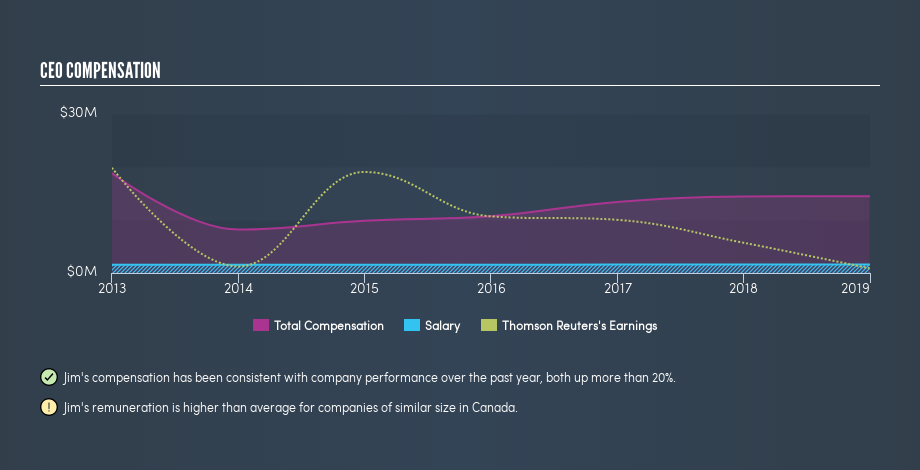
Want to participate in a short research study? Help shape the future of investing tools and you could win a $250 gift card!
Jim Smith has been the CEO of Thomson Reuters Corporation (TSE:TRI) since 2012. This report will, first, examine the CEO compensation levels in comparison to CEO compensation at other big companies. Then we'll look at a snap shot of the business growth. And finally - as a second measure of performance - we will look at the returns shareholders have received over the last few years. This process should give us an idea about how appropriately the CEO is paid.
See our latest analysis for Thomson Reuters
How Does Jim Smith's Compensation Compare With Similar Sized Companies?
Our data indicates that Thomson Reuters Corporation is worth CA$44b, and total annual CEO compensation is US$14m. (This figure is for the year to December 2018). That's a modest increase of 0.3% on the prior year year. While this analysis focuses on total compensation, it's worth noting the salary is lower, valued at US$1.6m. When we examined a group of companies with market caps over US$8.0b, we found that their median CEO total compensation was US$6.6m. Once you start looking at very large companies, you need to take a broader range, because there simply aren't that many of them.
Thus we can conclude that Jim Smith receives more in total compensation than the median of a group of large companies in the same market as Thomson Reuters Corporation. However, this doesn't necessarily mean the pay is too high. A closer look at the performance of the underlying business will give us a better idea about whether the pay is particularly generous.
You can see, below, how CEO compensation at Thomson Reuters has changed over time.

Is Thomson Reuters Corporation Growing?
On average over the last three years, Thomson Reuters Corporation has shrunk earnings per share by 22% each year (measured with a line of best fit). Its revenue is up 4.9% over last year.
Sadly for shareholders, earnings per share are actually down, over three years. The fairly low revenue growth fails to impress given that the earnings per share is down. So given this relatively weak performance, shareholders would probably not want to see high compensation for the CEO. Shareholders might be interested in this free visualization of analyst forecasts.
Has Thomson Reuters Corporation Been A Good Investment?
Boasting a total shareholder return of 63% over three years, Thomson Reuters Corporation has done well by shareholders. As a result, some may believe the CEO should be paid more than is normal for companies of similar size.
In Summary...
We examined the amount Thomson Reuters Corporation pays its CEO, and compared it to the amount paid by other large companies. We found that it pays well over the median amount paid in the benchmark group.
Neither earnings per share nor revenue have been growing sufficiently fast to impress us, over the last three years.But clearly there are some positives, because investors have done well over the same time frame. Given this situation we doubt shareholders are particularly concerned about the CEO compensation. CEO compensation is one thing, but it is also interesting to check if the CEO is buying or selling Thomson Reuters (free visualization of insider trades).
Important note: Thomson Reuters may not be the best stock to buy. You might find something better in this list of interesting companies with high ROE and low debt.
We aim to bring you long-term focused research analysis driven by fundamental data. Note that our analysis may not factor in the latest price-sensitive company announcements or qualitative material.
If you spot an error that warrants correction, please contact the editor at editorial-team@simplywallst.com. This article by Simply Wall St is general in nature. It does not constitute a recommendation to buy or sell any stock, and does not take account of your objectives, or your financial situation. Simply Wall St has no position in the stocks mentioned. Thank you for reading.
About TSX:TRI
Thomson Reuters
Operates as a content and technology company in the Americas, Europe, the Middle East, Africa, and the Asia Pacific.
Adequate balance sheet second-rate dividend payer.
Similar Companies
Market Insights
Community Narratives



